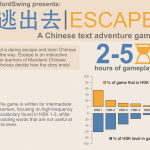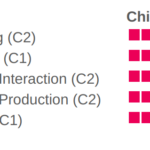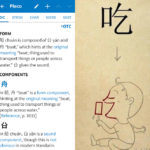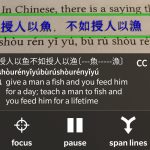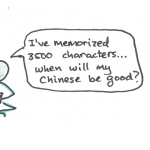Articles in the ‘Reading’ category Page 5
-
Learning Chinese words: When quantity beats quality
Any teacher, student or researcher will agree that vocabulary is important, but how should you go about it? What’s the goal? This article argues that a common problem for learners of Chinese is that they spend too much time learning too few words, and that they would be better of aiming for quantity over quality in many cases.
Read → -
When spaced repetition fails, and what to do about it
Spaced repetition software can boost your vocabulary learning significantly. The idea is to schedule each review as late as possible, but not so late that you forget the answer. This sounds good in principle, but when it comes to learning languages, just barely being able to come up with the right word is not enough!
Read → -
Text adventure games and how to use them in the Chinese language classroom
Interactive text games work well for individual learners, but they are also excellent in a classroom setting. This article gives you everything you need as a teacher to play Escape! in your classroom. A Chinese version of this article is available as well.
Read → -
How to figure out how good your Chinese is
Figuring out how good your Chinese is can help you focus on the right areas and evaluate your learning methods. But language assessment is hard! This article describes how and why you should assess how good your Chinese is, and gives you tools and resources to do so.
Read → -
5 levels of understanding Chinese characters: Superficial forms to deep structure
How much do you need to care about the actual composition and meaning of a Chinese character when learning it? In general, better understanding means it’s easier to learn, but is there a limit to how closely you should stick to actual etymology? This article explores the spectrum from using superficial images to real etymology from the perspective of a language learner.
Read → -
How important is reading speed on tests like HSK and TOCFL?
Reading speed is an issue on proficiency tests like HSK and TOCFL. But how much of a problem is it? How fast do you need to read? This article discusses the role of reading speed on proficiency exams.
Read → -
How to look up Chinese characters you don’t know
Looking up an unknown character in Chinese is much trickier than looking up unknown words in most other languages. This article discusses various ways of looking up Chinese characters, including paper dictionaries, handwriting input, OCR and more.
Read → -
Can too much guidance make you learn less Chinese?
Guidance and support can make learning Chinese easier, but could too much of it make it harder? This article discusses the downsides of receiving too much help and the benefits of engaging more with the Chinese language on your own, without having everything explained to you.
Read → -
New course: Unlocking Chinese – The Ultimate Guide for Beginners
Do you want to make sure your Chinese learning gets off to a good start? Or have you already started, but feel a bit confused and need guidance? Then my new course, Unlocking Chinese: The Ultimate Guide for Beginners, is for you!
Read → -
The nine principles of learning (and the mistakes from failing to follow them)
In 2014, Scott Young spent 100 days learning Chinese, after which he was able to speak freely on a wide range of topics, as well as pass HSK 4. Since then, he’s continued exploring effective learning and has now published a book called Ultralearning. He hasn’t abandoned Chinese, though, and in this article, he discusses nine important principles for effective learning and how they relate to studying Chinese.
Read →


